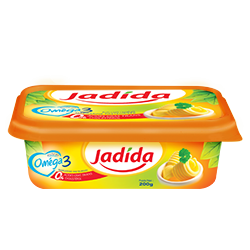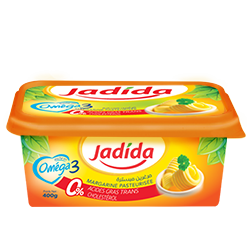What are the benefits of Omega 3?
Omega 3 reduces the risk of cardiovascular disease* by:
- Reduce the risk of stress and anxiety
- Decrease heart rhythm problems
- Participate in emotional balance
- Maintain the flexibility and fluidity of cell membranes.
Omega-3s are also essential for the optimal growth and development of children’s brains. They have beneficial effects on memory, concentration and learning abilities.
*As part of a balanced diet
Packaging formats
|
200g
|
400g
|
Packing - export
| Format / Packaging | 200g | 400g |
|---|---|---|
| Unité/ carton Units / box | 24 | 10 |
| Carton/ conteneur 40’Box / 40’ container | 4200 | 5000 |
| Carton/conteneur 20’Box/ 20’ container | 1848 | 2200 |
Storage conditions
Store away from humidity and at a temperature between 12 ° C and 15 ° C.
Ingredients and nutritional values
Non-hydrogenated vegetable oils (soybean / sunflower, palm, palm kernel), water, marine oil / linseed oil, whey powder, vegetable emulsifiers, salt, preservatives, antioxidant, vitamin E (3.6 mg / 100g), vitamin A (240 μg / 100g), nature-identical flavouring substances, colouring agent.
Average nutritional
values per 100 g
| Energetic value | 740 Kcal 3098 KJ |
|---|---|
| Proteins | <0,1 g |
| Carbohydrates | <0,1 g |
| lipids of which: | 82g |
| Saturated fatty acids | 28 g |
| trans fatty acids | 0 g |
| Monounsaturated fatty acids | 23 g |
| Polyinsaturated fatty acids | 31 g |
| fatty acids omega 3 | <0,82 g |
| fatty acids omega 6 | 8 g |
| Alimentary fiber | <0,1 g |
| Sodium | <1,7 g |
| Vitamin A | 3.6 mg |
| Vitamin E | 240 µg |






